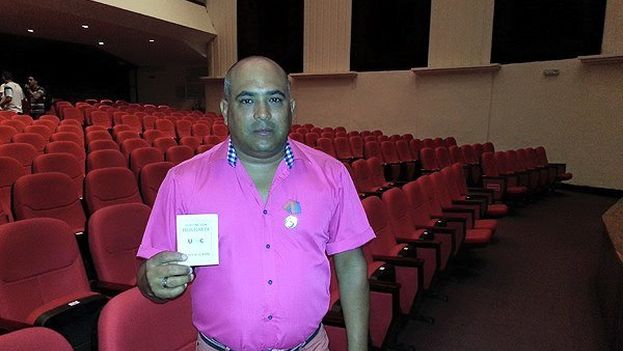
![]() Mario J. Penton, 14ymedio, Miami, 30 September 2016 — The National Ethics Commission of the Cuban Journalists Union (UPEC) this Thursday ratified the expulsion of journalist Jose Ramirez Pantoja from Radio Holguin. The ousted professional now will be able to appeal to the UPEC Congress, which could encourage the debate currently taking place about the role of censorship and the protection of the Communist Party over the press.
Mario J. Penton, 14ymedio, Miami, 30 September 2016 — The National Ethics Commission of the Cuban Journalists Union (UPEC) this Thursday ratified the expulsion of journalist Jose Ramirez Pantoja from Radio Holguin. The ousted professional now will be able to appeal to the UPEC Congress, which could encourage the debate currently taking place about the role of censorship and the protection of the Communist Party over the press.
The move comes after a long series of appeals since Ramirez Pantoja was expelled from his job last July 11. The journalist was penalized with removal from office for five years at the end of which he could return to work, provided he “has an attitude that comports with UPEC’s ethics code.”
14ymedio spoke by phone to Ramirez Pantoja who declined comment but did not deny the ruling.
“He is being pressured a lot by the authorities. They have told him that when he spoke with the independent press he complicated his case and in this trial they did the opposite of what they had announced: they treated him like dirt and affirmed an unjust sentence,” says a Holguin source close to the journalist.
“It was no use for Arnaldo Marabal [official journalist for the daily Giron in Matanzas] to try to ‘clean him up’ writing an interview in which he assures that Joseito is and always will be a revolutionary. They wanted him to pay the price in order to scare the others and so that no one dares to speak without permission,” adds the same source.
The Holguin journalist was dismissed from his job after publishing on his personal blog some controversial comments by the vice-president of the newspaper Granma, Karina Marron, about the current economic crisis in Cuba.
At the beginning of September, the recently elected president of the National Ethics Commission for UPEC, Luis Sexto Sanchez, visited Holguin in order to interview Ramirez Pantoja. After the interview and even though different people assured him that the situation would calm down and he would be able to return to his job, he received the ratification of the decision at both a provincial and national level.
Before the incident with Marron, Ramirez Pantoja even had been recognized with the highest distinction that UPEC awards, the Felix Elmusa. On that occasion, the same authorities who today condemn him to ostracism awarded him for fighting “from an ethical premise,” in order to make “the truth about Cuba” known to the world and “for educating, informing and revealing that Cuba is now free.”
Translated by Mary Lou Keel
